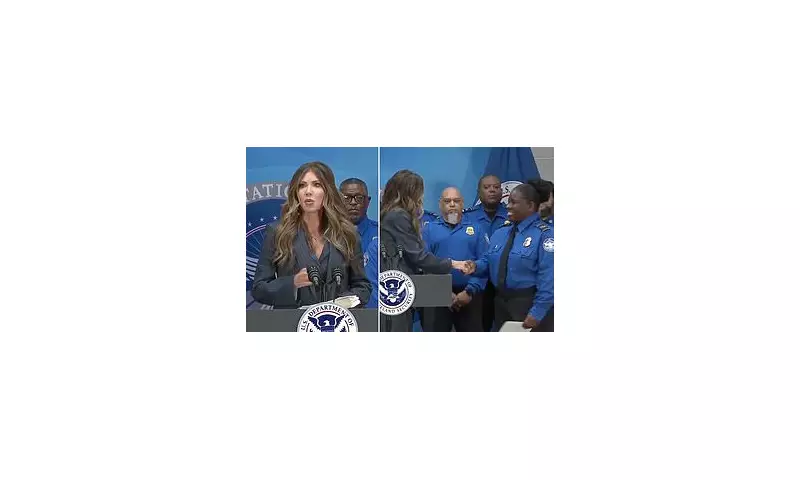
TSA Workers Rewarded for Service During Record-Breaking Shutdown
Homeland Security Secretary Kristi Noem has announced substantial bonus payments for Transportation Security Administration (TSA) agents who maintained essential services during the longest government shutdown in American history. The Secretary revealed she would be distributing $10,000 cheques to tens of thousands of employees who demonstrated exceptional commitment throughout the 43-day closure.
Recognition for Exemplary Service
During a press conference in Houston, Texas, Noem explained that agents who exhibited exemplary service across the United States during the six-week shutdown would receive the bonus payments. "We will be continuing to not only recognize employees across the country, but we will be looking at every single TSA official who helped serve during this government shutdown," Noem stated, with a group of agents standing behind her in support.
The Secretary personally handed white envelopes to government workers on stage with her, addressing each by name and shaking their hands. When questioned whether the criteria included employees who hadn't taken sick leave or stayed home for reasons unrelated to the shutdown, Noem clarified that "that's not necessarily the parameters."
"We're going to look at every individual that did exceptional service during this period of time when there were so many hardships," the Secretary added, emphasising the challenging circumstances faced by federal workers.
Travel Chaos and Wider Impacts
The shutdown, which began on October 1, created significant disruption across air travel networks throughout the United States. Flights experienced widespread delays and cancellations due to critical staffing shortages, with the situation reaching its worst point on November 9, when more than 10,000 flights were delayed and approximately 2,700 cancellations occurred.
Air traffic controllers received partial payment in mid-October but missed their first full paycheck on October 28. Passengers faced extensive wait times at airports, with some travellers experiencing delays lasting hours or even days before boarding their flights.
The travel sector wasn't the only area affected by the political impasse. Approximately 42 million Americans who depend on Supplemental Nutrition Assistance Program (SNAP) benefits found themselves without crucial food support. Food banks experienced overwhelming demand as panic spread among vulnerable communities.
Political Resolution and Fallout
The record-breaking shutdown finally concluded when President Donald Trump signed a bill on Wednesday evening that will fully fund the federal government. The House of Representatives passed the Senate's funding legislation with a 222 to 209 vote, allocating money for the Departments of Agriculture, Veterans Affairs, and military construction projects for fiscal year 2026.
Six Democrats broke ranks with their party to support the bill, including Washington Representative Marie Gluesenkamp Perez, who stated she voted to reopen the government because "the fight to stop runaway health insurance premiums won't be won by holding hungry Americans hostage."
President Trump used the occasion to criticise Democratic opponents, claiming they had created "the longest government shutdown in American history" for "purely political reasons." However, two Republicans – Thomas Massie of Kentucky and Greg Steube of Florida – opposed the legislation, with Steube objecting to a last-minute provision allowing eight Republican senators to sue the US government for up to $500,000 each.
The shutdown's primary cause centred on disagreements between conservatives and liberals regarding Affordable Care Act (ACA) health insurance subsidies. With the immediate crisis resolved, attention now turns to ensuring federal workers receive proper recognition and compensation for their service during this challenging period.





